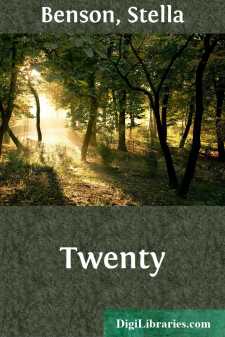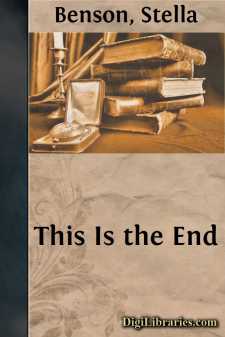Categories
- Antiques & Collectibles 13
- Architecture 36
- Art 48
- Bibles 22
- Biography & Autobiography 813
- Body, Mind & Spirit 142
- Business & Economics 28
- Children's Books 15
- Children's Fiction 12
- Computers 4
- Cooking 94
- Crafts & Hobbies 4
- Drama 346
- Education 46
- Family & Relationships 57
- Fiction 11828
- Games 19
- Gardening 17
- Health & Fitness 34
- History 1377
- House & Home 1
- Humor 147
- Juvenile Fiction 1873
- Juvenile Nonfiction 202
- Language Arts & Disciplines 88
- Law 16
- Literary Collections 686
- Literary Criticism 179
- Mathematics 13
- Medical 41
- Music 40
- Nature 179
- Non-Classifiable 1768
- Performing Arts 7
- Periodicals 1453
- Philosophy 64
- Photography 2
- Poetry 896
- Political Science 203
- Psychology 42
- Reference 154
- Religion 513
- Science 126
- Self-Help 84
- Social Science 81
- Sports & Recreation 34
- Study Aids 3
- Technology & Engineering 59
- Transportation 23
- Travel 463
- True Crime 29
Stella Benson
Stella Benson (1892–1933) was a British novelist, poet, and travel writer known for her witty and imaginative works that often blend fantasy and social commentary. Her novel "Living Alone" (1919) is a notable example, featuring witches and magical themes set against the backdrop of World War I. Benson traveled extensively, drawing on her experiences for books like "The Little World" (1925) and "The Poor Man" (1922). Despite her short life, her unique style and innovative narratives left a lasting impact on early 20th-century literature.
Author's Books:
Sort by:
by:
Stella Benson
CHRISTMAS, 1917 A key no thief can steal, no time can rust; A faery door, adventurous and golden; A palace, perfect to our eyes—Ah must Our eyes be holden? Has the past died before this present sin? Has this most cruel age already stonèd To martyrdom that magic Day, within Those halls, enthronèd? No. Through the dancing of the young spring rain, Through the faint summer, and the autumn’s burning,...
more...
by:
Stella Benson
THIS IS THE END BY STELLA BENSON 1917 This is the end, for the moment, of all my thinking, this is my unfinal conclusion. There is no reason in tangible things, and no system in the ordinary ways of the world. Hands were made to grope, and feet to stumble, and the only things you may count on are the unaccountable things. System is a fairy and a dream, you never find system where or when you expect it....
more...
by:
Stella Benson
CHAPTER I MAGIC COMES TO A COMMITTEE There were six women, seven chairs, and a table in an otherwise unfurnished room in an unfashionable part of London. Three of the women were of the kind that has no life apart from committees. They need not be mentioned in detail. The names of two others were Miss Meta Mostyn Ford and Lady Arabel Higgins. Miss Ford was a good woman, as well as a lady. Her hands were...
more...




